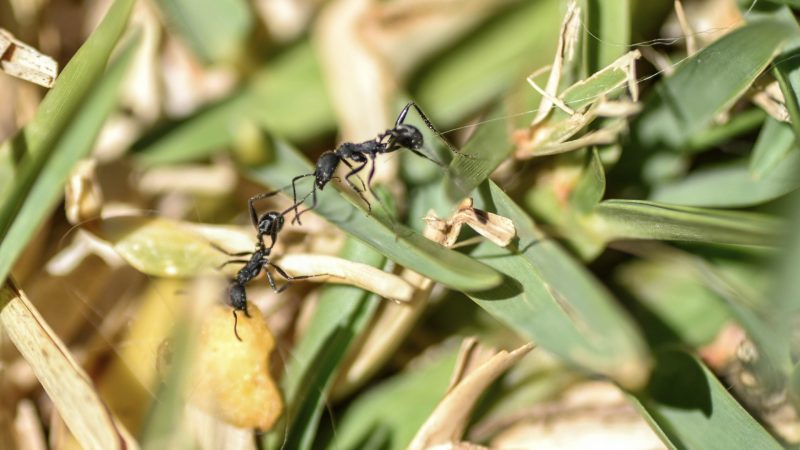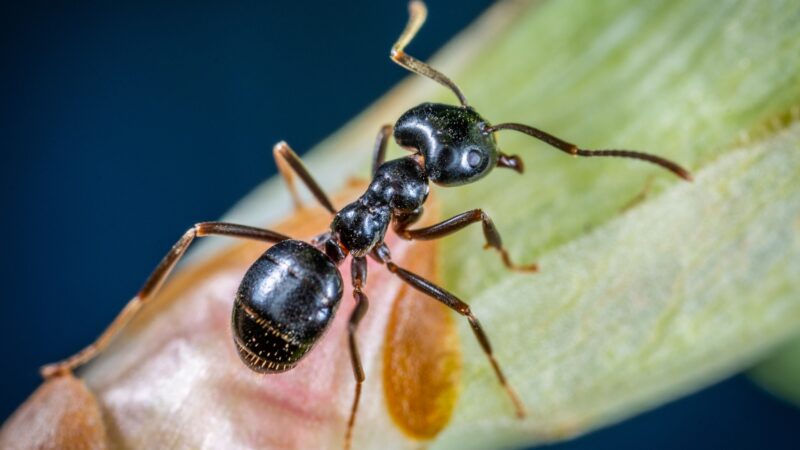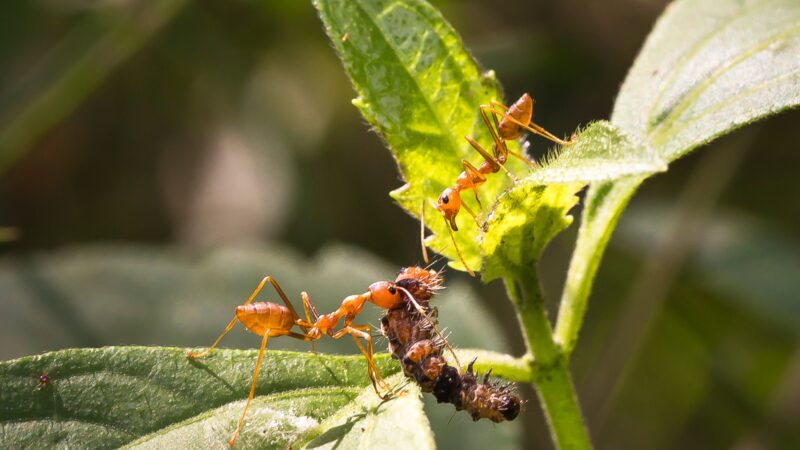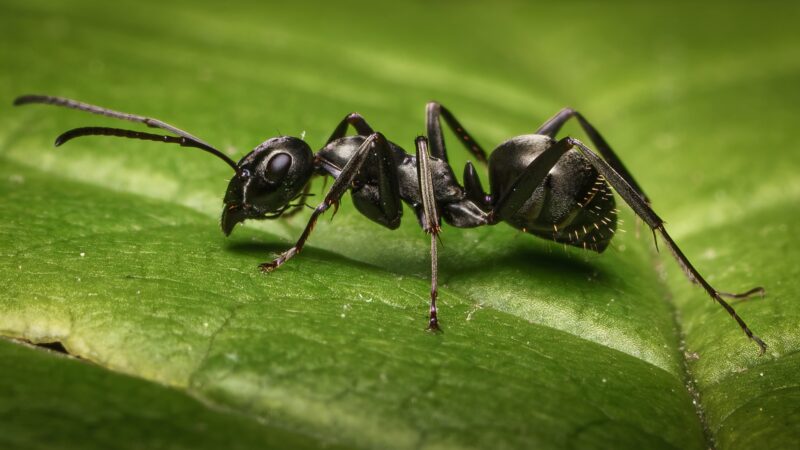Ants can have both positive and negative impacts on the vegetable garden. While they can help with pollination and control other pests, they can also damage plants and attract aphids. If the ant population becomes too large and threatens the health of your garden, it’s important to take steps to control their numbers.
How to get rid of ants in the vegetable garden? If you have an anthill in your garden, the best choice would be to use a liquid chemical or some natural remedy, like boiling water. In case you can’t find where the ants are coming from, the most effective method to use is the ant bait.
This article will provide information on identifying ant infestations in the garden and offer suggestions for controlling their numbers. We will also share a list of products that are safe and effective for use in vegetable gardens. By following these tips, you can keep your garden healthy and free of ant pests.
Are Ants Good for a Vegetable Garden?
Ants in normal numbers can bring a lot of good to a garden and we will mention all the important positive things about having them in your garden:
- Ants will help cultivate the soil. They dig tunnels that are used for circulating air, water, and all the minerals that roots need.
- If you have a problem with pollination, ants can be unintentional pollinators.
- Like all other insects, ants have their natural enemies and some of them are bad for your garden and plants. Ants will fight some unwanted pests and even eat their larvae and eggs, thus keeping their numbers under control.
Related: Ants in Garden: Are Ants Good for Plants in Your Garden?
Do Ants Harm Your Vegetable Garden?

The main problem with having a large number of ants in the garden is that they will farm aphids. Ants will practically protect them because they will feed on the honeydew that they produce. Another problem with ants is that some kinds of ants can bite and cause pain, like fire ants.
How Do Ants Harm Your Vegetable Garden?
Aphid development is aided by ants. By sucking the sap from your plants, aphids can harm them. The plant suffers harm, which may impede its growth.
Property harm by ants is a possibility. Plant roots may be harmed as a result of their ability to tunnel through the soil. In order to avoid causing structural harm, they can also construct their nests in crevices in walls, foundations, or other surfaces.
There is a risk of disease transmission via ants. They come into contact with sick plants or animals, then spread germs to healthy plants or animals through their bodies.
Ants can be nuisances because they might break into your house looking for food. When they create their nests in your yard, they may also start to bother you.
Some ants can bite people. Most ant bites are not harmful, however some ant species produce venom that can have major negative effects on health. It’s crucial to get medical help right away if you’ve been bitten by an ant.
Types of Ants in the Vegetable Garden
Carpenter Ants in Vegetable Garden

There are a lot of subtypes of carpenter ants, ranging in size between 6 and 13 millimeters. They don’t eat wood, they just carve it out to make room for their nests. Carpenter ants can be aggressive if you threaten their nest and their bite can be painful. Because they tend to make nests outside, gardens are often full of them.
Related: How to Get Rid of Carpenter Ants Without an Exterminator
Fire Ants in Vegetable Garden

Among many non-invasive types of fire ants, one stands out as a very aggressive kind – red imported fire ants. These ants come in great numbers because they reproduce quickly and once they invade your backyard and garden, you are in serious trouble.
Fire ant sting is particularly painful and it can take up to several weeks to heal. It is recommended to visit the doctor in cases where the symptoms go beyond blisters.
Related: How to Get Rid of Fire Ants: A Complete Guide
Black Garden Ant

As their name implies, black garden ants live outside, usually in the backyard or garden. Their worker ants are around 5 millimeters in length and can be a real pain to live with. They roam through your garden, thrash, and will search for food anywhere near where you live.
Signs of Garden Ant Infestations
Regularly check your plants for ant or other insect activity. Typical indications of an ant infestation include:
- Crawling on your plants are tiny, black bugs.
- Chewed-up or consumed leaves
- A sticky substance on the plants, like honeydew
- Ants on the ground swarming close to your plants
How to Treat Ants in Vegetable Garden: Instructions
Just as is the case with an indoor ant problem, the best way to deal with an outdoor and garden ant problem is to destroy their entire colony. We recommend using liquid and dust insecticide for ant hills, but alongside it, we advise using ant baits as they will deal with colonies that you are not able to identify.
Step 1: Identifying Ant Colonies
Try to find a source of your ant problem. It would be best if you could find every ant hill in your vegetable garden. That could take some time but it would help you immensely with the application of insecticide.
Step 2: Insecticide Application
Use dust insecticide directly on the mount. If you didn’t find the nest, try to locate their favorite routes to your garden. Place liquid or granule baits on their trails and after a couple of days, you will notice that ant numbers in your vegetable garden are getting smaller.
Step 3: Ant Barrier
Alongside the ant bait, placing any dust or some other repellents around your garden will keep any remaining ants away from your plants. Combining these steps will bring an end to the ant infestation in your garden.
How to Get Rid of Ants in the Garden Soil?
When you see loose piles of soil around your garden you probably found an ant mound. Be careful not to disturb it, because worker ants can relocate the queen if they sense any danger. For getting rid of ant nests in the ground, we would advise you to use pesticides in the form of dust which is directly applied to the mound.
You can find a lot of products online that can help you, but to ease your search we will recommend two of them that we think are very effective:
Delta Dust Multi-Use Pest Control Insecticide Dust
- Delta Dust Bed Bug Insecticide - 1 lb.
- Yield: 1 lb. of Delta Dust covers about 2,000 sq.ft.
- Target Pest: Ants, Bed Bugs, Boxelder Bugs, Cockroaches,...
- Active Ingredient: Deltamethrin, 0.05%
- Cannot ship to NY or CT.
Ortho Orthene Fire Ant Killer1
- Ortho Orthene Fire Ant Killer1 kills the queen, destroys the...
- This fire ant killer begins killing in just 60 minutes so you can...
- Kill fire ants outdoors on your lawn and around ornamental...
- To treat fire ant mounds, simply sprinkle the product over each...
- Use as part of the Ortho 2-Step System with Ortho Fire Ant Killer...
Both products are for outdoor use and they are in dust form. They are easy to use, just apply them on mounds and don’t water them. Leave it to take full effect for a day or two. It will destroy the whole colony, including the queen.
How to Get Rid of Ants on Vegetables, Fruits, or Flowers?
Having ants all over your plants can cause multiple problems, so keeping their number in check is something to work on. You can use a two-step defense of your plants. The first step would be placing the insecticide granules or baits around ant-infested plants and the second step is to use some of the natural methods or repellents.
Best Products for Ants in Vegetable Gardens
Using insecticide in the garden can sometimes disturb the natural balance and because of that companies developed products that are meant to be used around plants. Here is our choice for all your garden needs:
Monterey LG6150 Garden Insect Spray, Insecticide & Pesticide
- Fast acting and odorless - Monterey insect Killer is a bacterial...
- Controls many insects - the insect treatment Spray controls...
- Variety of uses - this pest control can be used on outdoor...
- Easy spray application - this CSI alternative product may be...
- Organic gardening - the active ingredient in our bug Killer spray...
When using products to control pests around vegetables you need to be careful when it comes to their composition. Using plant-friendly products will ensure a good harvest that is safe to eat.
The main ingredient of this product is a bacteria spinosad that doesn’t leave any odor and it can be used in organic gardening.
Terro 1806 Outdoor Liquid Ant Baits
- Kills the ants you see and the ants you don’t
- Pre filled bait stations are ready to use
- Contains sodium tetraborate decahydrate (Borax) (5.40%) and other...
- Flexible placement: in the ground using the stakes or on decks,...
- Patented station protects the bait from the elements, prevents it...
This liquid bait comes in the form of a cup and it is easy to access for ants. This ant bait is excellent for cases of a large ant infestation or when you suspect that there are a couple of ant nests nearby.
Natural Ant Killer for Garden
If you want to battle the ants in your garden with the help of natural remedies there are many options to choose from. But on the other side, these remedies are not as efficient as insecticides, so you are going to be making a compromise between efficiency and impact on the environment. The following are some of the natural solutions:
- Dish Soap – dilute the dish soap and sprinkle it over the plants that are heavily infested with ants. It will keep ants away for some time.
- Diatomaceous Earth – DE is essentially made from crushed fossilized algae. When used against ants and other pests, it causes damage to their exoskeleton and eventually they die from dehydration. It is safe to use around all kinds of plants, so use it freely.
No products found.
- Borax – this product has wide usage. It has shown great results against all kinds of pests.
- Can be Used as a Flux for Jewelry Casting and Seasoning Crucibles
- All Natural Multipurpose Cleaner: DIY Laundry Soap, Fabric...
- Packaged in a Convenient Resealable Heavy Duty Craft Pouch
- Perfect for Making SLIME
- Made In the USA
- Boiling Water – Pouring hot water into the ant’s nest is another all-natural technique to get rid of ants and keep them away from plants. When ants come into close contact with boiling water, they can be killed.
- Neem Oil -It suffocates the ants in the first place by entering their breathing holes and obstructing them, which makes them suffocate. This also disrupts the hormonal system of ants who then lose their hunger and their capacity to produce eggs as a result of absorbing it.
No products found.
- White Vinegar – Due to its extreme acidity, this chemical has the ability to burn an ant and obstruct its breathing openings. Mix it with boiling water if you wish to attack the ant colony and drown the ants while getting scorched.
Related: Best Natural Ant Sprays | Kids and Pet-Friendly Sprays
Organic Ant Control in Vegetable Gardens | Natural Methods

There are several organic repellants that you can use to keep ants out of your garden without actually killing them. The following are some of them:
- Citrus Spray – create a mixture of water and citrus and use it to sprinkle on and around the plants. It is safe to use around any plants and will deter ants from the area that was treated with this spray.
- Cinnamon – ants just hate the scent of cinnamon, but they will not die from it. If you just want to protect the plant, place a hard line of cinnamon dust around it, and for some time it will be safe from ants.
- Orange Spray – it works in the same way as a spray made of citrus. Ants hate the aroma of these fruits.
- Peppers – mix pepper with water and sprinkle this mixture around the garden. This will keep ants away for sure. Instead of pepper, you can use garlic for similar results.
Related: How to Get Rid of Ants in a Chicken Coop | Proven and Safe Methods
List of Sources
McCollum P., Get Rid of Ants in Your Vegetable Garden, Agriculture and Natural Resources, University of California
Controlling Fire Ants in the Vegetable Garden, Clemson University
Remove Ants & Aphids from New Raised Vegetable Bed, Agriculture and Natural Resources, University of California
- How to Get Rid of Copperheads | Practical Guide - August 27, 2023
- How to Get Rid of Corn Snakes | What Makes Them Aggressive? - August 27, 2023
- How to Get Rid of Alligators | Safety Measures and Removal Methods - July 16, 2023





